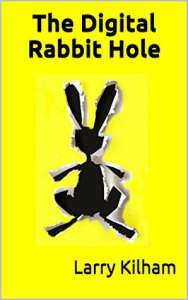In the digital age, we might not know everything, but we generally feel sure we can easily find all the information we need. In The Digital Rabbit Hole, Larry Kilham, experienced businessman and author, suggests that our choice to constantly seek answers in cyberspace may be our worst obstacle to true knowledge and wisdom.
Using the imagery of Alice in Wonderland as Alice descends into a mad and unpredictable world, Kilham illustrates how the digital age poses potential unseen dangers. Smartphones and other devices take away our willingness to solve problems on our own while demonstrably shortening attention spans. Compared to their parents or grandparents, today’s children show less interest in close family and real friends, and less initiative to do things that take a lot of time.
Kilham presents a persuasive and rather daunting analysis of what amounts to a current crisis that won’t go away without some amount of self-awareness about where we’re headed. Backing up his thesis, Kilham cites studies such as one showing that iPhone addicts experience physical anxiety when they are unable to answer their phones.
Kilham calls the “rabbit hole” we are trapped in the Knowosphere. Far from being a Luddite, he does recognize that the web has practical and useful aspects. Data collected by the Knowosphere (predicted to consist of a whopping trillion sensors by the year 2025) is reliable, safe, and instantaneously accessible. The level beyond the Knowosphere is Artificial Intelligence—computers that “think,” and robots, already increasingly present in our lives.
As Kilham logically demonstrates, all of these conveniences have their downside. An increase in multitasking is accompanied by a marked decrease in the ability to focus, which is no small issue. Focus is an essential element in creativity. The author strongly advises that our children should be offered internet toys only after they have been encouraged to “explore the world around them in the traditional ways.”
Though The Digital Rabbit Hole is not the first book to sound this warning, it is a thorough and well-organized look at the subject. Kilham writes rationally and has footnoted diligently. A business person, he is effective at putting large concepts into common parlance, making complex information accessible to any audience. His book amuses as well as provoking serious thought on this important subject. Without this levity, the book could come across as turgid or even judgmental, but he presents his argument persuasively.
Not entirely negative about the value of the digital world, and maintaining an effectively even-handed presentation, he offers suggestions for education and jobs based around the latest technologies, while strongly recommending that we do everything we can to increase our children’s, and our own, capacity for “curiosity, imagination and vision” without such technologies. He reminds us at every turn that we must understand that internet devices and media are simply tools, not an end in themselves, and that we need to find ways to disconnect from media and connect to nature, family and community. In all, it’s a vital message that may just reshape one’s attitude towards technology.
Kilham cleverly makes the case that it’s easy to get lost in our technological culture – a world of wonders, but also dangerous distractions. As such, The Digital Rabbit Hole is an important and eye-opening book that will be of use to anyone who uses the web.
Links
Author Site
Facebook
Twitter
Amazon
Goodreads
STAR RATING
Design
Content
Editing
Get an Editorial Review | Get Amazon Sales & Reviews | Get Edited | Get Beta Readers | Enter the SPR Book Awards | Other Marketing Services
























Leave A Comment